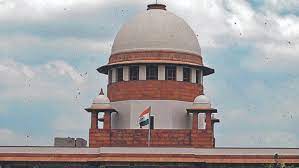The discharge order was held to be illegal on the ground that it was passed in violation of the principles of natural justice. (Para 1)
The first appellate Court by common judgment dismissed the appeal filed by State and allowed the appeal of the respondent-plaintiff holding him entitled to receive all service benefits as accrued. (Para 2)
Both the appeals were dismissed by the impugned judgment, against which the present appeals have been filed. (Para 3)
Except respondent-plaintiff who remained absent without any intimation. (Para 4)
It was stated therein that owing to prolonged absence from duty without intimation, respondent-plaintiff had no interest in training, and he lacked a sense of responsibility. Therefore, it was recommended that he cannot prove himself to be a good, efficient police officer and he is setting a bad precedent for other trainees. The S.P. further recommended for his discharge from service (Para 4)
It is apparent that the respondent was discharged from service under Rule 12.21 of PPR as the appellants were of the opinion that the probationer constable was not likely to become an efficient police officer. (Para 11
It is crystal clear that respondentplaintiff was appointed as a constable and joined the duties on 12.11.1989 on probation. During probation, while he was on training, he along with other trainee constables was deputed for law and order duty in Amritsar District on 24.11.1990. Respondent-plaintiff and other recruits were relieved from the said duty and reported back at the Training Centre, except respondentplaintiff, who remained on prolonged absence without any intimation to the Training Centre. (Para 18)
From perusal of the said Rule, it is apparent that in case a probationary constable is found unlikely to prove an efficient police officer, he may be discharged by the Senior Superintendent of Police at any time within three years from the date of enrolment. The S.S.P. relying upon the recommendation of the supervising officer (S.P., Training Centre) formed an opinion that the probationary constable is found unlikely to prove an efficient police officer owing to his demeanour as reported and discussed herein above. (Para 18)
Looking to the contents of the order of discharge, in the considered opinion of this Court, there is no foundation of misconduct alleged in the order and it is an order of simpliciter discharge of a probationer constable. (Para 19)
The discharge order was passed on the recommendation of the concerned supervisory authority of the Training Centre due to prolonged absence from training without any intimation. The authority found that the probationer constable has no interest in training, and no sense of responsibility, hence, he cannot prove himself a good, efficient police officer. In view of above discussion, both the referred cases are distinguishable on facts. (Para 20)
SUPREME COURT OF INDIA
2023 STPL(Web) 238 SC
[2023 INSC 798]
State Of Punjab And Others Vs. Jaswant Singh
Civil Appeal No. 11871 of 2014 With Civil Appeal No. 11634 of 2014-Decided on 5-9-2023
https://stpllaw.in/wp-content/uploads/2023/09/2023-STPLWeb-238-SC.pdf







